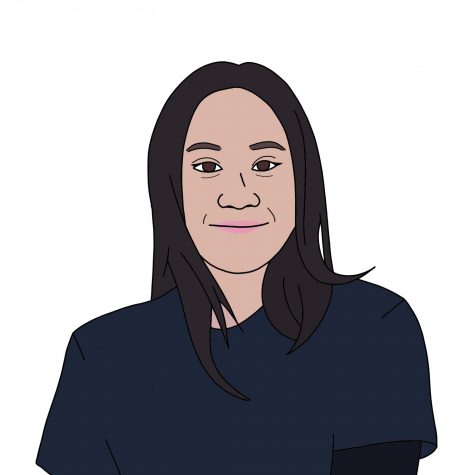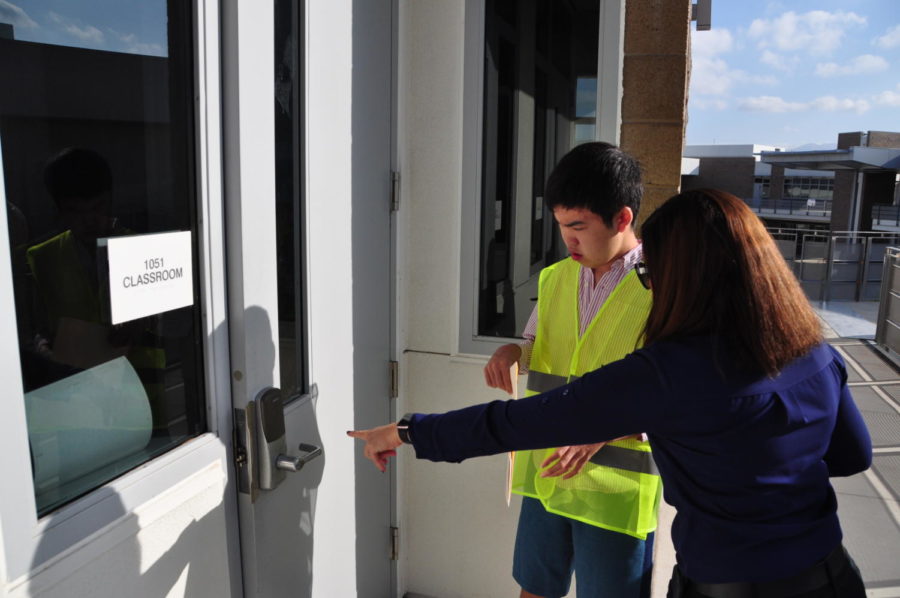Clean-Up Crew Expands
Senior Gordon Zhou prepares to deliver mail to math teacher Sarah Alewine classroom with the assistance of special education department chair Melody Resendez. Mail delivery is a routine aspect of Zhou and many other special education students’ routines and helps them establish a pattern of interaction with students and staff members.
Special education expanded its program in the 2019-20 school year, ushering in a slew of community projects designed to foster its students’ social development skills and to build community relationships.
Special education’s current projects serve as expansions to its classroom recycling and mail delivery systems launched last year. New additions include gardening, a coffee-ordering service dubbed “Brew Crew” and cooking classes, which have increased the variety of opportunities in which students develop communication skills.
“We wanted to get our students out and seen, that they’re giving back to their school [and] community,” special education department chair Melody Resendez said. “We wanted to inspire other students to take pride in their campus.”
The students, wearing bright yellow vests labeled with “Giving Back to PHS,” navigate their way around campus to complete their tasks. Brew Crew gives the students the opportunity to provide a service to staff members and to make logic-based choices to create the proper drinks. Cooking serves as a leisurely activity but also gives students real world skills and experience in the kitchen.
Alongside the personal interactions that accompany their duties, they also gain certain deductive-reasoning and organizational skills at their own pace with guidance from a helper only inches away.
“If they go to a teacher’s mailbox, they have to learn where the [name] might be,” education specialist Desiree Shaffer said. “It’s like an office skill they might use when they get a job down the line. It’s one more step they can add to their resume.”
A key aspect of the students’ growth through the program is their interaction with students outside their daily scope. According to Shaffer, the students are more receptive to interactions with their peers than with staff members.
“You guys have such a presence with our students, where we become more like another parent to them,” Shaffer said. “If you guys are communicating with them or working with them, then they’re gonna want to listen to you and learn from you.”
Peer feedback not only empowers the program’s students to influence their school, but also helps them understand their impact and personal progress. According to students from the program, the positivity surrounding their actions serves as a vehicle to power their progress.
“Everybody [will be] happy,” junior and special education student Joshua Ong said. “They will follow us to recycle bottles and help the environment. I feel kind of happy to make the school around me clean.”
The reception has been particularly memorable, especially through students supporting the program by volunteering to be buddies with special education students.
“We’ve been really lucky to see that the peers have been really accepting of our students and have been willing to be a buddy,” Shaffer said. “This goes a long ways for our students; they like that connection.”
Your donation will support the student journalists of Portola High School. Your contribution will allow us to purchase equipment and cover our annual website hosting costs.

Ajinkya Rane is one of the two Managing Editors, and it is his second year in that role. He has previously served as Co Editor-in-Chief and Sports Editor,...

Kelthie Truong is a Co-Managing Editor for the 2020-21 school year, her second and final year with the Pilot. When she’s not in the newsroom, you can...





